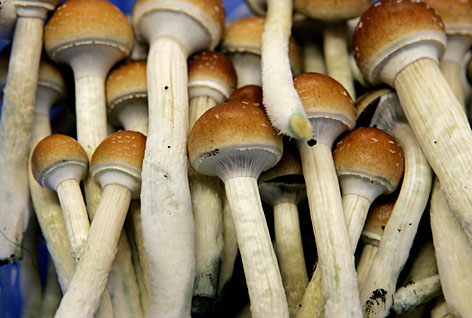Magic Mushrooms Could Treat Depression Say Scientists

The euphoric feeling one experiences during a psilocybin “magic mushroom”
trip could be crafted to treat depression and other illnesses say
British scientists, who have studied the brains of those using the
psychedelic substance.
Psilocybin, the psychoactive compound found in magic mushrooms was
analyzed in two separate studies and was found to suppress brain
activity in regions similar to that of pharmaceutical anti-depressants.
This evidence helps strengthen the argument of doctors and scientists
who believe that using natural psychedelic substances in a therapeutic
manner, along with professional psychotherapy, could be a step forward
in treating depression, addiction to hard drugs or alcohol, and other
ailments of the mind.
One of the studies, which is published in the Proceedings of the National Academy of Sciences journal (PNAS) [1],
showed that volunteers felt a mood-lifting shift in their perception of
self. Theoretically under the right coaching, this could help patients
change their outlook on life to be more positive.
The study of 30 volunteers was conducted by infusing extracted
psilocybin in to their bloodstream while their brains were monitored by
(MRI) scanners. This gave scientists a new understanding of how the
brain reacts to the substance.
The other study of 10 volunteers, scheduled for review by the British
Journal of Psychiatry this Thursday, discovered that people under the
effects of psilocybin had increased recall of personal memories. This
would help aid psychotherapy for those with deep rooted traumatic
memories or simply those unable to loosen up during counseling sessions.
The MRI scans focused on the medial prefrontal (mPFC) and the
posterior cingulate (PCC) cortexes of the brain. These areas are thought
to play a role in how we construct our self identity. High doses of
psychedelics are known to strip away this identity for short periods of
time, potentially allowing deeper and more successful therapy sessions.
Professor David Nutt of Imperial College London, who gave press statements on Monday said that psilocybin “caused activity to decrease in areas [of the brain] that have the densest connections with other areas.” [2]
“We now know that deactivating these regions leads to a state in which the world is experienced as strange,” and therefore the barricaded thinking that locks somebody in to depression can be breached for psychotherapy.
The mPFC is known to be hyperactive in those with depression.
Psilocybin reduces this activity similar to often criticized drugs like
Prozac, which has a litany of negative side effects. Few negative side
effects have been noted for psilocybin, potentially making it a safer
and natural alternative to the current crop of money makers, if used in a
controlled environment where any short term anxiety can be alleviated.
Serious scientific studies on psychedelics have been on the increase
over the past decade as the hysteria left behind from the 60s and 70s
has died down.
“They got banned because they could see society changing,” said Prof Nutt. “There was great concern about that. Since then they’ve been virtually impossible to research.” [3]
Original studies on the likes of LSD in the 1950s through the 1970s
were left somewhat open ended, when special interest groups and
politicians jumped on the perceived damage being caused by recreational
use. As maturity wins out, the benefits of these drugs are beginning to
be re-discovered and further researched.
In September last year studies from The Johns Hopkins University
School of Medicine concluded that magic mushrooms may have long-lasting
positive effects on personality, and that they increase openness, a
psychological term referring to an appreciation for new experiences [4], or as the man on the street calls it: “The Afterglow”.
This could potentially break people out of depressive cycles, where
going out and experiencing the world is the last thing on the sufferer’s
mind.
The most recent studies also show that psilocybin in magic mushrooms
reduced blood flow in the hypothalamus, a part of the brain where people
who suffer from a condition known as cluster headaches show increased
blood flow. Thus there’s the potential to reverse the condition.
Professor Nutt hopes that going forward he’ll be allowed to conduct
psilocybin trials specifically designed for patients who haven’t been
helped by big pharma drugs or traditional behaviour-based psychotherapy.
This may be an uphill battle however, as it was Nutt, former chairman
of the Advisory Committee on the Misuse of Drugs (ACMD) who clashed with
then Home Secretary Alan Johnson after criticising the decision to
toughen the law on cannabis, something science has now proven to be
relatively harmless, and significantly beneficial for its pain relief
and cancer fighting properties.
Nutt said it was “damned difficult,” to find any support for
his work. The Medical Research Council snubbed him and the Wellcome
Trust, the largest research charity in England, flatly refused to fund
him. Getting his findings in the peer reviewed literature has also had
it’s share of intellectual snobbery, as both Nature and Science, the two
most prestigious scientific journals, refused to publish the findings
despite no scientific reason not to do so.
The pharmaceutical industry, who make millions from anti-depressant
drug sales will do all they can to prevent their profits being cut in
to. If that fails they’ll most likely find a way to take ownership of
psilocybin.
Nutt hopes his new trial will go ahead this year.